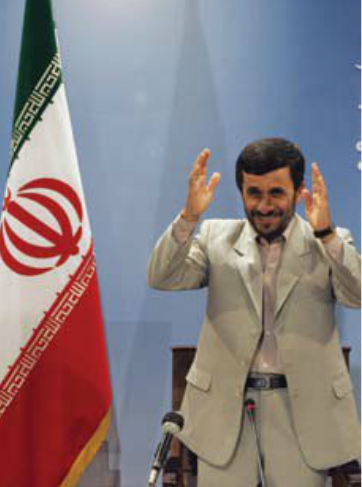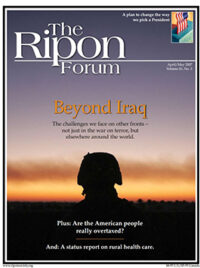
Four years into the war in Iraq, the insurgency, the civil war and ongoing U.S. and coalition casualties remain a key focus of Administration attention and a dominant focus in the media.
Until recently, the Washington policy debate about what to do in Iraq –summarized by U.S. military planners as “go big, go long, or go home” – was at center stage. Despite the discussion on Capitol about setting a timeline, the reality is that large-scale withdrawal of U.S. troops from Iraq is not going to happen anytime soon. Indeed, with U.S. forces surging, Iraq promises to headline Washington’s Middle East policy agenda for some time to come.
The intense focus on Iraq is understandable. After all, the future disposition of Iraq – whether it is a stable or chaotic, democratic or Islamist, moderate or militant state – will have significant policy implications for Washington and its regional interests. Not the least of which is that a defeat in Iraq will undermine U.S. credibility in the region, damaging the position of our allies in that part of the world.
But the challenges in the Middle East for the Bush Administration go well beyond whether the U.S. can ultimately bring stability to a war-torn Iraq. Indeed, throughout the Middle East, Washington faces several confrontations that could profoundly affect U.S. interests in the region and around the globe.
Topping this list is the Global War on Terrorism (GWOT), which according to President Bush, may take “decades” to win. In the absence of Al Qaida attacks on U.S. soil, it will prove challenging – not only for the Bush Administration, but for other Administrations that follow – to maintain popular support for an ongoing war in which the American public has little sense of imminent threat.
Still other Middle East challenges for Washington revolve around the struggle to define regional politics as either pro-West, with a moderate democratic outlook, or pro-Iranian, with a militant Islamist agenda. Ongoing developments in the Palestinian Authority and Lebanon are good examples of the struggle.
…the challenges in the Middle East for the Bush Administration go well beyond whether the U.S. can ultimately bring stability to a war- torn Iraq.
In the West Bank and Gaza, the Iranian-allied Islamist Hamas and the largely secular and ostensibly moderate Fatah PLO led by Palestinian President Mahmoud Abbas are engaged in a power struggle. Hamas won a landslide victory in the January 2005 parliamentary elections and is now competing with Fatah, which signed the Oslo Accords with Israel, for control of the Palestinian Authority. While Fatah is no panacea (Fatah itself has periodically engaged in terrorism to wrest political and territorial concessions from Israel) the Administration has nonetheless backed Fatah with money and weapons vis-à-vis Hamas, and has led an international effort to isolate the Islamist terrorist organization.
Whether Fatah will ultimately emerge victorious in its fight with Hamas remains an open question. At present, it appears that Hamas has the upper hand. Recently, the groups agreed to a power-sharing arrangement and have established a “government of national unity,” blurring the lines between the organizations and their policies. But Hamas continues to adhere to its platform advocating the destruction of Israel and will not change its stripes. In this context, the Administration is hoping – perhaps ill- advisedly – to re-energize the long-stalled Palestinian-Israeli negotiations. Given the dynamics on the ground, the challenge for the Administration will be strengthen its nominal ally Fatah, without legitimating Hamas and without compelling Israel to make further territorial concessions to a Palestinian Government that at least in part does not recognize Israel’s right to exist.
Along similar lines, the Administration also faces a formidable challenge in Lebanon, where the pro-West democratically elected government of Fouad Siniora has found itself under siege by the Iranian-Syrian backed Shiite militia/political party Hizballah. Even with the Lebanese Armed Forces behind them, the Siniora government is outgunned by Hizballah, which has come to represent some 35% of the Lebanese electorate (nearly the entirety of Lebanese Shiite community) through a potent combination of provision of services, a reputation for being non-corrupt, and an unhealthy degree of intimidation. Hizballah is using its clout to press for more political power, and to protect its Syrian patron from being implicated in the United Nations investigation into the 2005 assassination of former Lebanese Prime Minister Rafiq Hariri.
To strengthen the legitimate Lebanese government against the Iranian-backed Hizballah onslaught, over the past two years the Administration has pledged nearly $1 billion in economic and military assistance. Beyond financial support, the U.S. has done yeoman work in advocating and pushing through several key U.N. Security Council Resolutions in support of the government. But more needs to be done to protect the one democratic success story in the region.
The Siniora government has proven quite resilient, but Iran and its proxies remain committed to rolling back the U.S. allies in Beirut. In this regard, Hizballah might find it expedient to attack the U.N. peacekeepers in the South in a gambit to chase them out of Lebanon and denude the government of some of its international backing. The departure of U.N. forces would leave Beirut and Washington in a difficult position.

…other Middle East challenges for Washington revolve around the struggle to define regional politics as either pro-West, with a moderate democratic outlook, or pro-Iranian, with a militant Islamist agenda.
Of course, much of what happens in Lebanon is dependent on developments in Syria. The Iran-backed Asad regime in Damascus continues to pursue its unhelpful policies of supporting the insurgency and destabilizing Iraq, supporting Hizballah and destabilizing Lebanon, and supporting Hamas and destabilizing the Palestinian Authority, all the while repressing the Syrian people. Over the past seven years, in an effort to encourage a change in Syrian behavior, the Bush Administration alternately engaged with, and then led an international effort to, isolate Damascus. Unfortunately, it was to no avail. Given the precedent and the nature of the Asad regime, future attempts at engagement – although recommended by the Iraq Study Group – are also unlikely to succeed.
Fortunately, the U.N. investigation into the Hariri assassination may prove a moment of opportunity. Should top Syrian officials be indicted by an international criminal court, Damascus may look for a deal ala Libya to preserve the Asad regime. Regardless of what happens, the result would be a dramatically weakened Asad regime presumably with less ability to undermine U.S. policy goals in the region. For Washington, though, perhaps the most import implication of a diminished Damascus would be the detrimental effect of this development on Syria’s strategic ally, Iran.
In defiance of the international community, Iran – the leading state sponsor of terrorism – is currently making progress toward building a nuclear weapon. Should Iran succeed, it would endanger the U.S., Israel, and Europe, as well as moderate Sunni Arab states, and likely spark a nuclear arms race in the Middle East. At present, the Administration is working through the U.N. to foster consensus to levy economic sanctions and raise the price for Iranian intransigence. In the coming years, the challenge for Washington will be to maintain a diverse international coalition in opposition to an Iranian nuclear weapon. In the worst case scenario, this same coalition may be called upon to consider other measures, including military action, to prevent Tehran from acquiring the bomb.
From Beirut to Tehran to Baghdad, Washington is facing a broad range of challenges. The Bush Administration has tried to address these challenges through military means, as well as through democracy promotion and reform – an effort that to date has had mixed results at best. In the coming years, the Administration and its successor will have to contend with these issues. Complicating matters is the fact that Washington’s regional allies are not only largely weak and indecisive, but also sometimes play both sides.
Admittedly, it is a full agenda. But the stakes are high. Fortunately, Washington has demonstrated an appreciation that these problems will not age well and require a real sense of urgency to resolve.
David Schenker is a senior fellow at the Washington Institute for Near East Policy. From 2002 to 2006, he was the Syria, Lebanon, Jordan, and Palestinianaffairs adviser in the Office of the Secretary of Defense.




